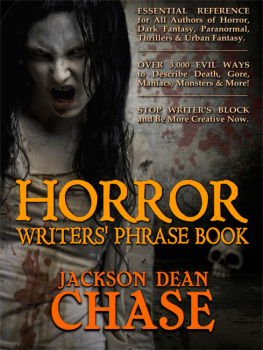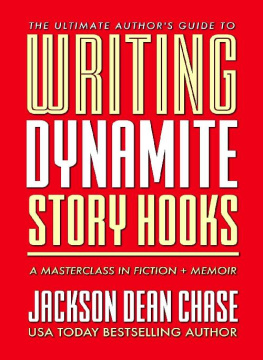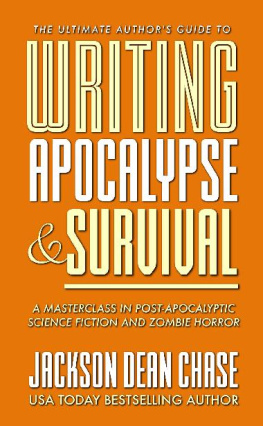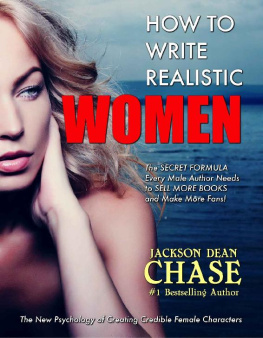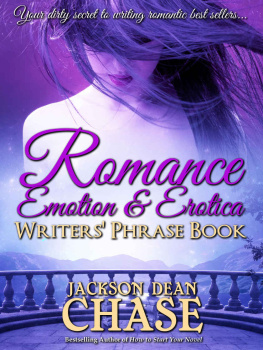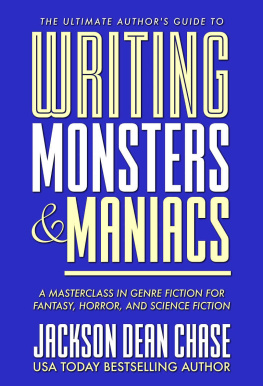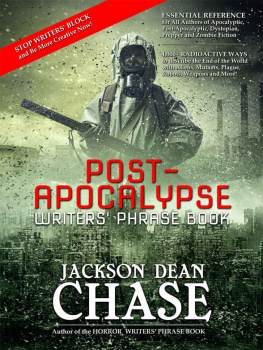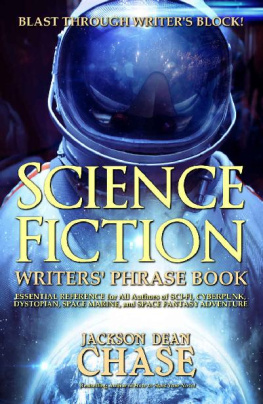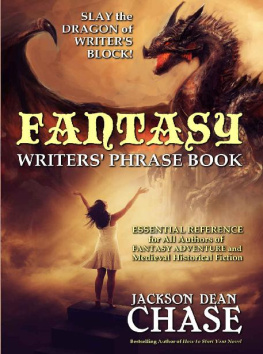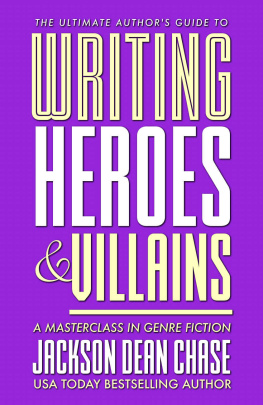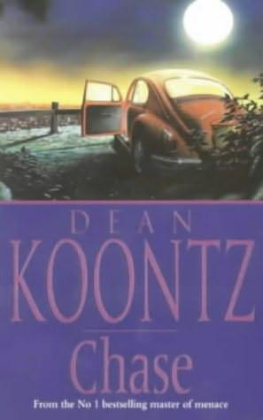Jackson Dean Chase - Horror Writers Phrase Book
Here you can read online Jackson Dean Chase - Horror Writers Phrase Book full text of the book (entire story) in english for free. Download pdf and epub, get meaning, cover and reviews about this ebook. year: 2015, publisher: Jackson Dean Chase, genre: Art. Description of the work, (preface) as well as reviews are available. Best literature library LitArk.com created for fans of good reading and offers a wide selection of genres:
Romance novel
Science fiction
Adventure
Detective
Science
History
Home and family
Prose
Art
Politics
Computer
Non-fiction
Religion
Business
Children
Humor
Choose a favorite category and find really read worthwhile books. Enjoy immersion in the world of imagination, feel the emotions of the characters or learn something new for yourself, make an fascinating discovery.
- Book:Horror Writers Phrase Book
- Author:
- Publisher:Jackson Dean Chase
- Genre:
- Year:2015
- Rating:4 / 5
- Favourites:Add to favourites
- Your mark:
- 80
- 1
- 2
- 3
- 4
- 5
Horror Writers Phrase Book: summary, description and annotation
We offer to read an annotation, description, summary or preface (depends on what the author of the book "Horror Writers Phrase Book" wrote himself). If you haven't found the necessary information about the book — write in the comments, we will try to find it.
Horror Writers Phrase Book — read online for free the complete book (whole text) full work
Below is the text of the book, divided by pages. System saving the place of the last page read, allows you to conveniently read the book "Horror Writers Phrase Book" online for free, without having to search again every time where you left off. Put a bookmark, and you can go to the page where you finished reading at any time.
Font size:
Interval:
Bookmark:
INTRODUCTION I'm going to tell you a secret: A lot of what you write isn't what you say, it's how you say it. Sure, characters, story structure, and dialogue are important. There are a ton of books written on those subjects for a reason. But you could be an expert in all those things and still fail to tell a compelling story. Why? Well, to be a truly great writer, you must constantly find new ways to say the same old things. Let's say you're writing a novel about a family of inbred chainsaw cannibals terrorizing college kids in the woods. How many different ways can you think of to describe being killed by a chainsaw? Or of being afraid and alone? What about the trees, the weather, the wildlife? Remember, these things are going to come up dozens of times and you've got hundreds of pages to fill! The same problem springs up no matter what your story is about, whether it's a vampire romance, ghostly haunting, or zombie apocalypse.
Sooner or later, you'll find yourself writing the same descriptions over and over. And you'll agonize over each and every one, wondering how to inject new energy into them. But what if you didn't have to? What if you had an entire book of ready-made tags to inspire you at a moment's notice? TAGYOU'RE IT! Wait! What are tags, you ask? Tags are short descriptive phrases peppered between the dialogue and strung throughout the narrative. Done with skill, the reader never notices them, but their dramatic resonance is deeply felt. Trust me, your readers will notice if they're missing or not up to snuff! Consider the difference between saying, He glared at her and she became afraid, or His gaze burned with such intensity she felt her soul shiver. Which one do you prefer? Which is creepier and more exciting? Sure, both get the author's point across, but the second is more likely to leave the reader breathless and scrambling to turn the page. Tags are like bullets.
They are the greatest weapons in a writer's arsenal. The more you have, the more firepower you can bring to bear, blasting boring lines to bits and breathing new life into even the most mundane characters and situations. INSTANTLY WRITE BETTER HORROR This book provides the tools you need to get the job done and takes aim at those writing within the Horror, Dark Fantasy, Gothic, Paranormal, Thriller, and Urban Fantasy genres. However, Action, Crime, Fantasy, and Post-Apocalyptic writers will also find much of use in these pages as a variety of handy, cross-genre subjects are covered such as weapons, magic, disease, and the darker emotions. Horror requires building the right atmosphere to create an emotional connection to its reader. Without one, why would anyone care if Susie Swanson gets trapped at her parents' lake house by an army of zombies? She'd just be human hamburger like so many cardboard characters in bad novels and B-movies.
But if you can get inside Susie's head and really feel what it's like to be her, you can make the reader love her, fear for her, and pray she survives the night. In the best fiction, whether you make poor Susie a throwaway victim in the prologue or the heroine herself, she becomes a stand-in for readers to project themselves into and identify with. Readers want to feel her fear, her isolation, the sense of impending doom hanging over her as all hope seems lost. That is what turns what might have been a cheap gore scene into a moment of grueling terror and suspense. So how do we make our example character more meaningful? We assign Susie's thoughts, words, and actions greater power with every tap of our keyboard. In short, we punch her up with tags.
And we do the same for the zombies. And her boyfriend. And anyone else we want the reader to care for or be afraid of. That goes for places and inanimate objects, too. Perhaps the lake cabin is located on a mist-shrouded island haunted by a sinister past, and as soon as Susie stepped inside, the door slammed shut, sealing the four walls of her fate. But that's just the tip of the iceberg. Remember the zombies? It's time to inject some life into them: Outside, the hungry dead howled for her blood. Reading that, I bet you're excited to get started, right? But first, a warning DON'T GO CRAZY! Use your intuition.
Not every line needs to be punched-up. After all, sometimes it's perfectly fine (and even more dramatic in a minimalist sense) to say, He shot him, instead of The bullet blazed through bone, spattering brains in a crimson mist. Nor is it wise for every act, thought or description to be over-the-top or made to stick out unnecessarily. But when you want to really emphasize something, to build atmosphere and heighten emotion, nothing beats a well-written tag. Use them right, use them well, and your stories will never be the same. HOW DO I USE THIS BOOK? At the very least, just flipping through these pages should jumpstart your creative juices, especially if you've come down with a bad case of writer's block. You can use the tags as writing prompts to help you generate new scenes or even entire stories, but the most common method is to use them as quick fill in the blanks whenever you need a line.
You have my permission to copy them as is, or customize them however you like. Some tags are more specific than others, so you may find it helpful to swap out whatever doesn't work with whatever you need. For example, changing the gender of the character or type of weapon or action is easily done, as is replacing the generic pronouns given with your character's names or some other vivid description instead (e.g., changing the man to the cruel killer). You can achieve a variety of exciting effects by mixing and matching tags (or parts of tags) from the same or different categories to create new ones. Say you need to describe Susie seeing a zombie for the first time and your mind draws a blank. Simply flip to the Supernatural Menace section, then to Zombies.
Scan the listed tags until you find one you like, then use it as is or challenge yourself to rewrite it in your own style, or use it as a creative springboard to come up with your own completely original tags. For example, you could combine It moaned and moved toward me, moldy lips peeling back from broken gums, and A blood-caked abomination crawled into view, its lower half gone, to become A blood-caked abomination moved toward Susie. So you not only have all the individual tags as written, but you also have an incredible number of combinationsa number limited only by your imagination. There's no wrong way to use this book except not to use it all. It's yours. Feel free to tinker with it. Mark it up, write in the margins, but whatever you do, have a gruesome good time! Yours Ghouly,Jackson Dean Chase I'd love to hear from you and get feedback for revised editions and sequels. EXERCISE #1: Read all the listed tags from your category or subcategory, making note of the top ten tags you like and the bottom ten you don't. EXERCISE #1: Read all the listed tags from your category or subcategory, making note of the top ten tags you like and the bottom ten you don't.
Now challenge yourself to revise, combine, or otherwise alter all ten of your favorite tags, then do the same to improve your least favorite ones. EXERCISE #2: Combine parts of tags from one category with those from another, mixing-and-matching as best you can to create new effects. For example, a specific headshot from Guns could be combined with a kill from Decapitation and Head Trauma. You could take this one step further, using an entirely different weapon (such as an axe), or maybe even make the head explode or be torn off by a monster, magic spell, or psychic attack. EXERCISE #3: Challenge yourself to come up with at least ten totally original tags on your favorite subject. BLACK
Next pageFont size:
Interval:
Bookmark:
Similar books «Horror Writers Phrase Book»
Look at similar books to Horror Writers Phrase Book. We have selected literature similar in name and meaning in the hope of providing readers with more options to find new, interesting, not yet read works.
Discussion, reviews of the book Horror Writers Phrase Book and just readers' own opinions. Leave your comments, write what you think about the work, its meaning or the main characters. Specify what exactly you liked and what you didn't like, and why you think so.

